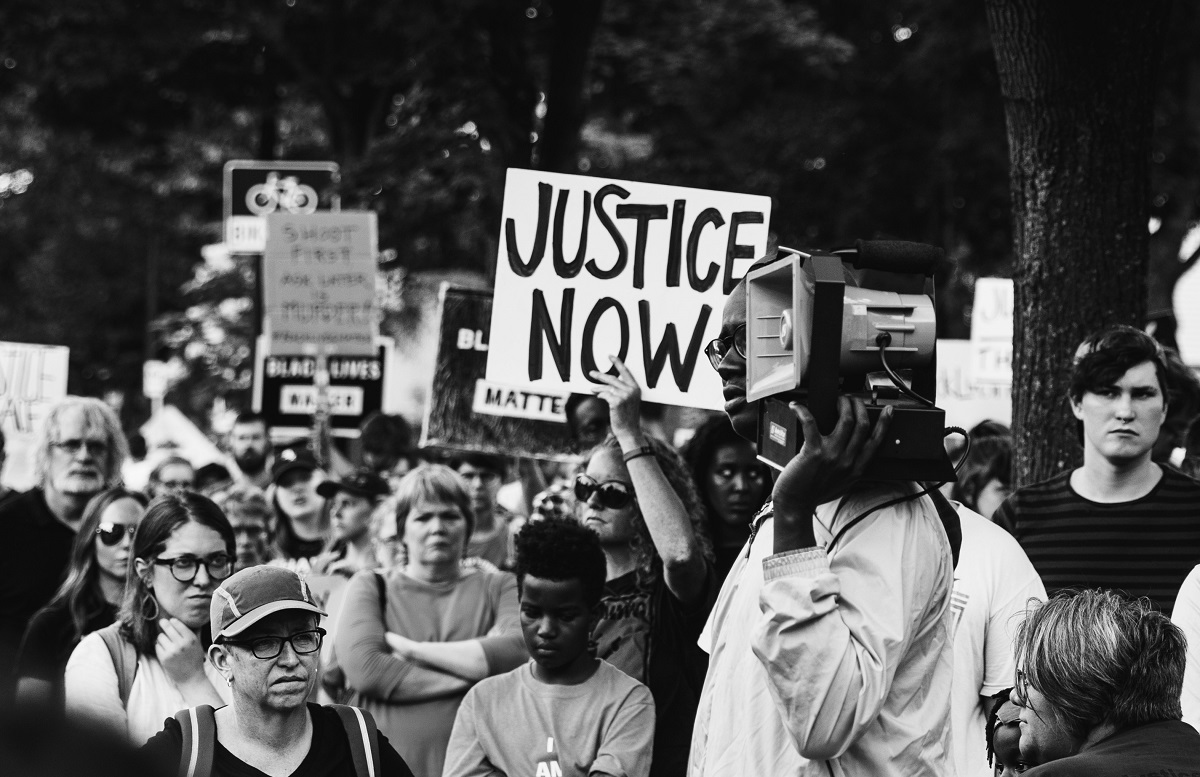I typically think of justice as making sure that when people do things that are wrong, they get the punishment they deserve. But here, God’s justice is not focused on punishing the wrongdoer. Rather, it is focused on protecting the vulnerable and restoring peace.
By Amy Julia Becker, the author of White Picket Fences.
A friend from church mentions that he—a white man with a handlebar mustache and a penchant for Tae Kwon Do—has been listening to African American spirituals lately. He doesn’t know anything about my recent practice of prayer, but he says, “I got kind of annoyed.” He looks down, almost apologetic, and then continues, “The music was beautiful, but at the same time it just kept going on and on and on, especially the part that was sad. It was like the sadness was never going to end, but they were going to keep singing about it until they got an answer.”
His experience of listening echoes my experience of prayer. His words come as a strange affirmation that we are invited to cry out until things change for good, and when they don’t change, to persevere in faith, not by pretending it’s all better but by continuing to cry out.
And even though I question my commitment to this effort, and even though it feels futile and frustrating and I want to give up, I also start to see shoots of growth. First, in my own thinking. As I pray through the Lord’s Prayer with justice in mind, I am struck by that very basic sentence, “Give us this day our daily bread.” (Luke 11:3) What pops out at me is the corporate nature of those words. It isn’t “Give me this day my daily bread” or “Give my family our daily bread,” though in the past that has been how I was inclined to think about that clause. I used to even translate that line in the prayer into the specifics of my daily life: Give me what I need to take care of these children. Give me the words I need to write. Give me what I need to get through another day of managing our household. Give me.
 But Jesus instructs us to pray very differently. His prayer includes me, but it is so much bigger than me. Give us. All of us. I’m not just praying for what I need. My relationship with God isn’t just about me and my family. It’s about entering into the needs of others and imploring for all of us. I see my own self-centeredness that day. I see that my reluctance in prayer isn’t just about boredom or hunger or futility, it is also about my own unwillingness to acknowledge and respond to the needs of my brothers and sisters in this world.
But Jesus instructs us to pray very differently. His prayer includes me, but it is so much bigger than me. Give us. All of us. I’m not just praying for what I need. My relationship with God isn’t just about me and my family. It’s about entering into the needs of others and imploring for all of us. I see my own self-centeredness that day. I see that my reluctance in prayer isn’t just about boredom or hunger or futility, it is also about my own unwillingness to acknowledge and respond to the needs of my brothers and sisters in this world.
Another Monday when I am daydreaming about the food I’m not eating, and my mind is wandering away from the praying I am supposed to be doing, I try to focus my attention by reading a series of verses in the Bible about justice. I find a sampling:
-Administer true justice; show mercy and compassion to one another. (Zechariah 7:9)
-The Lord loves righteousness and justice; the earth is full of his unfailing love. (Psalm 33:5)
-The Lord longs to be gracious to you; therefore he will rise up to show you compassion. For the Lord is a God of justice. (Isaiah 30:18)

When I read those words, instead of guiding my prayers, they help me realize how little I understand the biblical notion of justice. I typically think of justice as making sure that when people do things that are wrong, they get the punishment they deserve. But here, God’s justice is not focused on punishing the wrongdoer. Rather, it is focused on protecting the vulnerable and restoring peace. Justice has to do with restoring relationships, with healing the social and emotional and spiritual fabric of individual lives and whole communities. God’s justice isn’t really about who should go to jail and who should be compensated for wrongdoing. It is about a whole different way of being in the world, God’s way of being in the world, with mercy and unfailing love and compassion at the center.
In the midst of my meager attempts at prayer, I start to see myself differently. With my Princeton degree and my experiences as someone who can argue a case and get what I want, I have been seeing the problems of racism and class divides in our country through the lens of superiority. I think I have the things that everyone else wants, and now I am enlightened enough to share. Here, have my education and my way of dressing and my reserved emotions and my exercise regime. Have my positive discipline methods for your children. Have my wealth so that your daughter can go to ballet class and your son can take piano lessons. Have my walks through the woods and my sweet little town with the green and the churches and the white picket fences. It strikes me that there are plenty of people who don’t want ballet class and the New England countryside. But they do want to be treated with dignity. They do want fairness. They do want safety and stability and opportunity. My life is not the answer to the world’s problems, and it humbles me to see the ways I have assumed that it is.
One other verse strikes me almost like a blow. It comes from Micah, one of the short, prophetic books in the Bible. When I was younger, I learned a song set to these words, so they have been inscribed on my consciousness for decades. But today, as I look at the passage again, I see something I have never seen before. Micah 6:8 reads, He has shown you, O mortal, what is good. And what does the Lord require of you? To act justly and to love mercy and to walk humbly with your God. For many years, I have been someone who wanted to do justice and love mercy, but finally I see how often I have done so without any humility, without any acknowledgment of my own inadequacy, my own helplessness, my own need. For so long, I have wanted to change the rest of the world. I didn’t want the rest of the world to change me.

The practice of prayer is changing me. I thought it would bring me face to face with the pain of the world outside. Instead, it is making me aware of the ways I cut myself off from that pain through alcohol, entertainment, judgment, or other distractions. I thought it would show me how I could take action. Instead, it is beginning to show me how much I still need to learn.
Taken from White Picket Fences: Turning Toward Love in a World Divided by Privilege by Amy Julia Becker. Copyright © 2018. Used by permission of NavPress. All rights reserved. Represented by Tyndale House Publishers, Inc.
 White Picket Fences by Amy Julia Becker
White Picket Fences by Amy Julia Becker
The notion that some might have it better than others, for no good reason, offends our sensibilities. Yet, until we talk about privilege, we’ll never fully understand it or find our way forward.
Amy Julia Becker welcomes us into her life, from the charm of her privileged southern childhood to her adult experience in the northeast, and the denials she has faced as the mother of a child with special needs. She shows how a life behind a white picket fence can restrict even as it protects, and how it can prevent us from loving our neighbors well.
White Picket Fences invites us to respond to privilege with generosity, humility, and hope. It opens us to questions we are afraid to ask, so that we can walk further from fear and closer to love, in all its fragile and mysterious possibilities.




